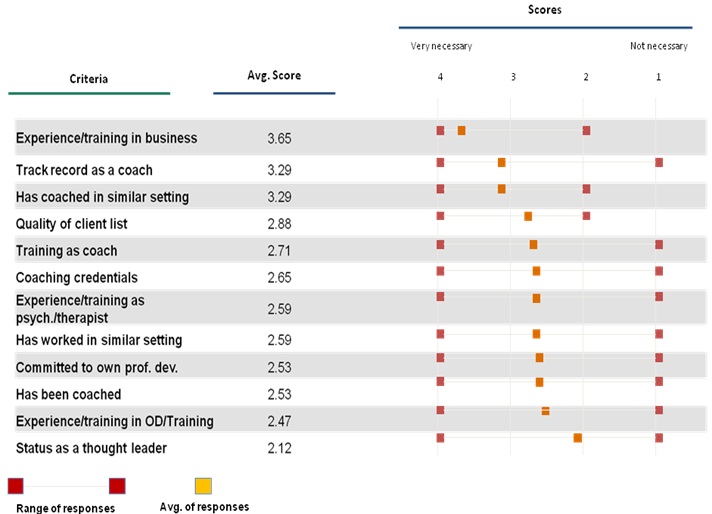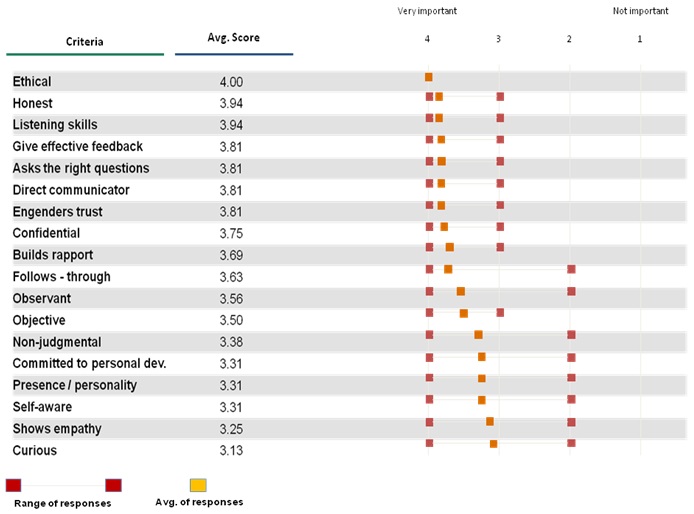Hypothesis and Findings
I had made a number of assumptions, based on my personal experience as both a coach and a client, about what the data would show. As you will see, the actual survey findings were slightly different.
Initial Beliefs
Coaching Background
- Participants want coaches to possess formal coaching credentials and accreditation.
- Business and training/OD background is equally valued by participants.
Coaching Qualities
- Participants seek coaches with whom they are comfortable and can openly discuss issues.
- Participants are generally wary of direct communication and open, honest feedback.
Survey Findings
Coaching Background
It is important to note that the scoring on these questions was quite broad with participants’ ratings varying across the full range of possible scores – Not Important (1) to Very Important (4) – on 9 of the 12 questions. (Figure 3)
1) Participants want coaches to possess formal coaching credentials and accreditation
In truth, coaching credentials and accreditation ranked in the middle of the pack. At the top of the list, survey respondents want coaches who have practical, business experience and a track record of coaching in a similar setting. They are seeking someone who understands their jobs/work environments and the specific interpersonal dynamics and challenges they face. Interestingly, working in a similar setting ranked somewhat low while coaching in a similar setting ranked quite high.
Sample survey participant comments:
However, does sharing experiences create a potential blind spot for coaches and executives? According to Christine Turner,”while it may sound counterintuitive, it can be a real benefit if the coach’s professional background is different from that of the executive. It allows the coach to enter into the relationship from a place of naiveté, with curiosity and questions, not assumptions and recommendations.”
2) Business and training/OD background are equally valued by participants
As shared above, business experience/training ranked #1, while experience/training in psychology ranked #6 and experience/training in OD/training ranked #8. Clearly, participants in this study strongly value business experience over more humanistic studies and work experiences.
Still, participant comments suggest that when asked more open-ended questions without rankings, clients do seek a blend of pragmatic, business background and psychology.
Sample survey participant comments [about what people want?]
Figure 3 – Coaching Background Survey Results
 As my study had a small sample size, a quick check of some public studies verified the findings.
As my study had a small sample size, a quick check of some public studies verified the findings.
1) An HBR study revealed that 29.2% of respondents rated coaching certification and 13.2% rated psychological training as very important. The 17 participants’ ratings were 23.5% and 23.5%, respectively, in line with the HBR study. Participants also indicated their strong preferences for coaches with experience coaching in a similar setting: 65.2%.
2) Business experience also ranked #1 in an AMA study, with 68% choosing frequently while only 33% selected coaching certification frequently. [I don’t understand the use of “frequently” here.]
Coaching qualities
The range of scores was much narrower on the coaching quality questions, with participants choosing only the top two response boxes – Important (3) and Very Important (4) – on 9 of the 17 questions. (Figure 4)
3) Participants seek coaches with whom they are comfortable and can openly discuss issues
As coaching is part of an internal leadership development program, it is not particularly surprising that this group of participants ranked ethics and honesty, along with listening skills at the top of their list of attributes desired in a coach, confirming the hypothesis.
Sample survey participant comments:
The 2013 ICF Global Coaching Survey also found that confidentiality is a key issue in all coaching relationships and was discussed by all of the respondents interviewed.
As an HR professional, I understand and have seen the important and delicate job of building and maintaining trust within an organization. Ina Smith, in the Executive Coaching Masterclass at Ashridge Business School shares, [executive coaching is] expected to be entirely confidential and offers a safe place to acknowledge self-doubts and explore options. Most executive coaches would acknowledge that although organizations have the right to expect results they do not have the right to know how those results were obtained. A sense that your coach is “on your side” is essential – although challenge as well as support should be expected.
Coaching is virtually a mandatory part of my company’s leadership development curriculum. During training, participants form into small groups and meet with the facilitator in breakout sessions. After the initial training session, small groups are scheduled to continue meeting with their external coach. While the coaches are external, the entire program is managed internally. I believe that this speaks to the safe learning environment established throughout the leadership development curriculum, where ground rules are explicitly set and discussed, as well as to the readiness, motivation and interest in personal growth and development of our leaders.
I believe these findings also support the value of providing clients a choice of coaches and an opportunity to interview each when selecting a personal coach.
4) Participants are generally wary of direct communication and open, honest feedback
Executive coaches are not for the meek. They’re for people who value unambiguous feedback. All coaches have one thing in common; it’s that they are ruthlessly results―oriented.― Fast Company
Echoing the quote above, giving effective feedback, asking the right question, and providing direct communication all tied for 3rd in the rankings of what clients are looking for in a coach, all vastly different than what I anticipated.
Sample survey participant comments:
Conversation is at the root of the coaching relationship. While coaches need to express themselves, the vast majority of the time, coaches are in listening or inquiry mode. It is the executives who are using expression to its fullest. Christine Turner explains in her article Executives on Executive Coaching that during coaching executives… think out loud, become more reflective and gain access to their own tacit knowledge and unexplored ideas.
However, there is also a communication skill that coaches use that sits between expression and inquiry.…silence is also a factor in the linguistic makeup of executive coaching, cites William Pennington. Coaches use silence to think, reflect and generate insights.
An essential tool for generating self-awareness in executiving coaching is feedback. According to Judge and Cowell (1997), the best executive coaches use some form of 360 feedback with their client. Indeed, research has confirmed that the use of 360 feedback is one of the best methods to promote awareness of skill strengths in managers (Hagberg, 1996; Rosti and Shipper, 1998; Shipper and Dillard, 2000).
Together, structured coaching sessions with multisource feedback are a winning combination to change managerial behaviors toward more effective interactions…
says Ryan Smernick in The Linkage Leader.
Figure 4 – Coaching Qualities Survey Results
 Summary
Summary
In summary, the data from both the internal survey and external studies contradicted several of my initial hypotheses.
However, findings did support one of the initial hypotheses – Hypothesis 3- Participants do seek coaches with whom they are comfortable and can openly discuss issues.
While the data wasn’t entirely what I expected, it was useful to enhance my understanding of the different criteria to consider when selecting an executive coach, and what the potential tradeoffs. For instance, offering a coach from a similar industry and background to the client may facilitate acceptance and rapport building. However, for clients who are more open or have experience working with a coach, it may be helpful to offer coaches with different backgrounds who can broaden their perspective. In either case, an open and transparent discussion with the client about the benefits and tradeoffs of different backgrounds will be beneficial to both the coach and the client in setting a strong foundation for success. Similarly, educating clients about the coaching process will help them to better appreciate the skills the coach brings to the coaching conversation but also the role the client will play.
And while not the intent of this study, it is interesting to note the commonality of coaching frameworks around the world. While individual clients will seek and appreciate different facets of the coaching relationship and engagement given their own unique backgrounds and experiences, there appears to be a very strong shared set of commonalities that will guide the profession forward.